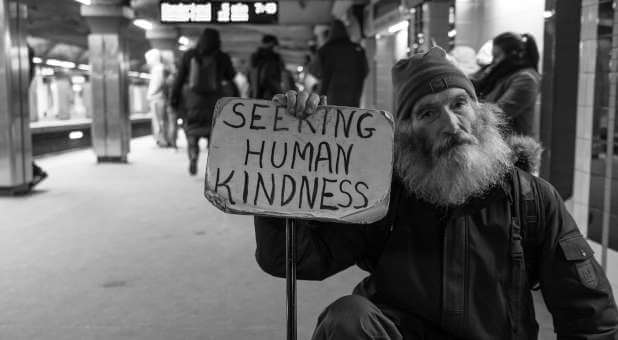As we learn what the real Jesus taught, we quickly come to see that our vertical relationship with God should directly affect our horizontal relationships with people. Christianity is not only about how we relate to God but also about how we relate to others.
The way we treat others mirrors what is going on in our own souls. If our walk with God does not touch those in our circles of influence with His love and compassion, then we must question the health of our walk.
Some people think they are close to God because they go to church, yet in day-to-day life they are rude, impatient and selfish. This ought not to be, and Jesus displayed the exact opposite. He walked and moved with compassion, and as we are conformed to His image, our lives should be marked by compassion too.
Jesus was a lover of people. He loved His creation. He smiled at humanity. He came to earth with a heart of compassion. During His formal ministry, which was basically a three-year walk to the cross, Jesus helped people from the time He woke up in the morning until He went to sleep at night. He healed them. He fed them. He gave them something to drink. He spoke life into them. Jesus never turned away the wounded and brokenhearted. It was the self-righteous, religious hypocrites whom He sternly rebuked.
Matthew writes that once, after being followed by a large crowd, Jesus healed all the sick who were present—all of them. Then Matthew quotes from Isaiah, adding a prophecy concerning Jesus: “A bruised reed He will not break, and a smoldering wick He will not quench” (Matt. 12:20a). John Abbott wrote in his acclaimed Bible commentary, “The bruised reed and smoking flax [wick] are emblems of helplessness, dejection, and sorrow. The images are expressive of the mildness and gentleness with which Jesus instills truth into the minds of his followers, and of the tender care which he exercises in sustaining the weak, restoring the fallen, and raising the dejected and desponding.”
In Luke 10:25–37 we read that a religious expert comes to Jesus and asks what he needs to do to be saved. Jesus directs the man to what is written in the Jewish law: “‘You shall love the Lord your God with all your heart, and with all your soul, and with all your strength, and with all your mind,’ and ‘your neighbor as yourself.'”
Trying to justify himself and test Jesus, the guy asks, “And who is my neighbor?” Jesus never flinches. He tells the parable of the good Samaritan, a story of how three people—a priest, a Levite and a Samaritan—react to a person in need. He starts with the priest: “A man went down from Jerusalem to Jericho and fell among thieves, who stripped him of his clothing and wounded him and departed, leaving him half dead. By chance a priest came down that way. And when he saw him, he passed by on the other side” (Luke 10:30-31).
In place of priest, you could put pastor, which hits close to home for me. The story is alarming because this priest/pastor saw the injured man and moved to the other side of the road. I don’t know why he didn’t help. Maybe he thought the man was too far gone, and there was nothing he could do. Some commentators believe the priest had just finished ministering in Jerusalem and was returning to Jericho. Jericho is about 15-18 miles away, with a descent of more than 3,000 feet. The desert road is arid; the air is salty, and the weather is hot—crazy hot.
Sweaty and exhausted, this priest probably felt as if he’d already done his spiritual duty. It’s easy to be judgmental toward him, yet I’ve been that man many times. I’ve poured myself out in ministry, felt empty and simply passed by when the next need appeared. It seemed too inconvenient for me to dive in and do something. But the parable makes it clear that the priest was in the wrong, no matter his excuse. And we’re all guilty of the same thing at times. We pass by on the other side.
Like many of us, the priest thought spirituality was a matter of worshipping God, reading the Scriptures and paying his tithe. Of course, those things are important, but if our worship remains vertical and never turns horizontal, we miss the whole point. The most spiritual thing you can possibly do is love and help your neighbor.
The real Jesus is about helping the guy on the side of the road—yes, even before going to church.
Excerpted from Chapter 6 of The Real Jesus by Jonathan Stockstill. {eoa}
Jonathan Stockstill is a third-generation lead pastor of Bethany Church in Baton Rouge, Louisiana. At the age of 30, Jonathan transitioned from worship pastor to lead pastor of Bethany Church, following in the footsteps of his father, Larry Stockstill, and his grandfather, Roy Stockstill.
Read articles like this one and other Spirit-led content in our new platform, CHARISMA PLUS.











































